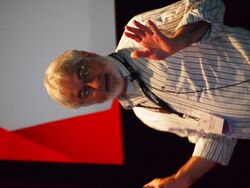Biography:Edward N. Zalta
Edward N. Zalta | |
|---|---|
 Zalta speaking at the Wikimania 2015 | |
| Born | Edward Nouri Zalta March 16, 1952 |
| Education |
|
| Era | Contemporary philosophy |
| Region | Western philosophy |
| Institutions |
|
| Thesis | An Introduction to a Theory of Abstract Objects (1981) |
| Doctoral advisor | Terence Parsons |
Main interests | Epistemology, metaphysics, philosophy of language, intensional logic, philosophy of logic, philosophy of mathematics, intentionality, situation theory |
Notable ideas | Abstract object theory, exemplifying and encoding a property as two modes of predication, Platonized naturalism,[1] computational metaphysics |
Edward Nouri Zalta[2] (/ˈzɔːltə/; born March 16, 1952) is an American philosopher who is a senior research scholar at the Center for the Study of Language and Information at Stanford University. He received his BA from Rice University in 1975 and his PhD from the University of Massachusetts Amherst in 1981, both in philosophy.[2] Zalta has taught courses at Stanford University, Rice University, the University of Salzburg, and the University of Auckland. Zalta is also the Principal Editor of the Stanford Encyclopedia of Philosophy.[3]
Research
File:Wikimania 2015 - Edward Zalta.webm Zalta's most notable philosophical position is descended from the positions of Alexius Meinong and Ernst Mally,[4] who suggested that there are many non-existent objects. On Zalta's account, some objects (the ordinary concrete ones around us, like tables and chairs) exemplify properties, while others (abstract objects like numbers, and what others would call "non-existent objects", like the round square, and the mountain made entirely of gold) merely encode them.[5] While the objects that exemplify properties are discovered through traditional empirical means, a simple set of axioms allows us to know about objects that encode properties.[6] For every set of properties, there is exactly one object that encodes exactly that set of properties and no others.[7] This allows for a formalized ontology.
References
- ↑ Linsky, B., and Zalta, E., 1995, "Naturalized Platonism vs. Platonized Naturalism", The Journal of Philosophy, 92(10): 525–555.
- ↑ 2.0 2.1 Zalta, Edward N. (2009). An Introduction to a Theory of Abstract Objects (1981) (Thesis). ScholarWorks@UMass Amherst. doi:10.7275/f32y-fm90. Retrieved July 21, 2020.
- ↑ "Editorial Information". Stanford Encyclopedia of Philosophy (Spring 2018 ed.). Stanford University: The Metaphysics Research Lab. March 21, 2018. https://plato.stanford.edu/archives/spr2018/info.html. Retrieved May 31, 2018. "Principal Editor: Edward N. Zalta, Senior Research Scholar, Center for the Study of Language and Information, Stanford University"..
- ↑ Zalta 1983, p. xi.
- ↑ Zalta 1983, p. 33.
- ↑ Zalta 1983, p. 36.
- ↑ Zalta 1983, p. 35.
Works cited
- Anderson, David J.; Zalta, Edward N. (2004). "Frege, Boolos, and Logical Objects". Journal of Philosophical Logic 33 (1): 1–26. doi:10.1023/B:LOGI.0000019236.64896.fd.
- Zalta, Edward N. (1983). Abstract Objects: An Introduction to Axiomatic Metaphysics. Synthese Library. 160. Dordrecht, Netherlands: D. Reidel Publishing Company. ISBN 978-90-277-1474-9.
External links
 |

